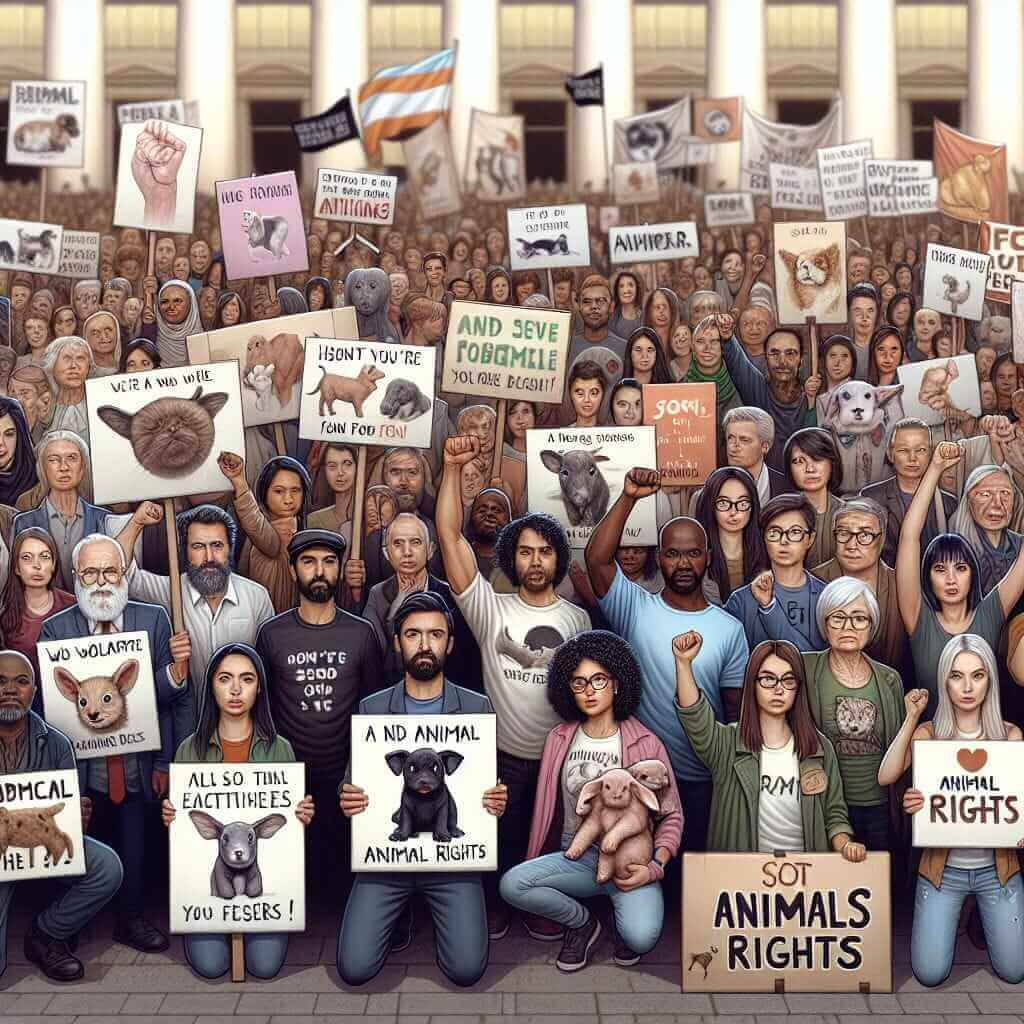Animal rights have become an increasingly prominent issue in modern society, prompting discussions and debates around the ethical treatment of animals. This topic frequently appears in IELTS Writing Task 2, requiring test-takers to express their opinions on various aspects of animal welfare.
Below, we will delve into some potential IELTS essay questions related to the importance of animal rights, analyze one question in detail, and provide a model essay showcasing the qualities of a Band 8 response.
Potential IELTS Essay Questions
Here are some potential IELTS essay questions related to animal rights:
- Some people believe that animals should have the same rights as humans, while others argue that this is not practical or necessary. Discuss both views and give your opinion.
- With the increasing demand for food and resources, some people believe that animal welfare is no longer a priority. To what extent do you agree or disagree?
- Many people believe that zoos are cruel and should be banned, while others argue that they play a vital role in conservation efforts. Discuss both sides of this argument and give your own opinion.
Sample Essay Question
“Some people believe that animals should have the same rights as humans, while others argue that this is not practical or necessary. Discuss both views and give your opinion.”
Analysis of the Question
This question presents a classic “discuss both views and give your opinion” structure. You are expected to:
- Present both sides of the argument: Acknowledge the viewpoints of those who support equal rights for animals and those who believe it’s impractical or unnecessary.
- Provide supporting evidence and examples: Illustrate each side’s arguments with relevant reasons and examples.
- State your opinion clearly: Express your stance on the issue and support it with sound reasoning.
Model Essay
In contemporary society, the ethical treatment of animals has become a subject of considerable debate. While some individuals advocate for equal rights for animals and humans, others contend that such a notion is unrealistic and unwarranted. This essay will explore both sides of this argument before presenting my personal viewpoint.
Proponents of granting animals the same rights as humans argue that animals, like humans, are sentient beings capable of experiencing pain and suffering. They believe that exploiting animals for food, clothing, entertainment, or research is morally reprehensible and infringes upon their fundamental right to a life free from cruelty. They often cite instances of animal abuse in factory farms, laboratories, and circuses as evidence of the urgent need for stronger legal protections for animals.
Conversely, opponents of equal animal rights maintain that such a concept is impractical and disregards the inherent differences between humans and animals. They argue that humans possess a higher level of cognitive ability and moral reasoning, which justifies our use of animals for various purposes. Furthermore, they highlight the economic and societal benefits derived from animal agriculture, biomedical research, and other industries that rely on animals. They contend that imposing stringent animal rights would have detrimental consequences for these sectors and, by extension, human society.

While I acknowledge the economic and practical challenges associated with granting animals equal rights to humans, I firmly believe that we have a moral obligation to treat all living creatures with compassion and respect. Animals deserve to be free from unnecessary suffering and exploitation. However, I recognize that a balanced approach is necessary, one that considers both animal welfare and human needs. This might involve implementing stricter regulations for animal agriculture and research, promoting cruelty-free products, and fostering greater public awareness about animal sentience.
In conclusion, the debate surrounding animal rights is complex and multifaceted. While there are valid arguments on both sides, I believe that a society that values compassion and empathy should strive to ensure the humane treatment of all living creatures. By finding a balance between animal welfare and human needs, we can create a more just and compassionate world for all. (Word count: 326)
Notes on the Essay
- Structure: The essay follows a clear and logical structure, addressing both sides of the argument before presenting a balanced opinion.
- Vocabulary: The essay utilizes sophisticated vocabulary related to the topic, such as “sentient beings,” “morally reprehensible,” “cognitive ability,” and “detrimental consequences.”
- Grammar: The essay demonstrates a strong command of complex grammar structures, including conditional clauses and passive voice, used appropriately to enhance clarity and coherence.
- Examples: While the essay does not provide specific examples, it alludes to general instances to support its claims (e.g., animal abuse in factory farms). In an actual IELTS exam, it’s recommended to include more specific examples to strengthen your arguments.
Vocabulary
- Sentient (adjective): Able to perceive or feel things. (pronounced: sen-tee-uhnt)
- Reprehensible (adjective): Deserving condemnation; unacceptable. (pronounced: rep-ruh-hen-suh-buhl)
- Cognitive (adjective): Relating to the mental processes of understanding. (pronounced: kog-ni-tiv)
- Detrimental (adjective): Tending to cause harm. (pronounced: det-ruh-men-tuhl)
- Compassion (noun): Sympathetic pity and concern for the sufferings or misfortunes of others. (pronounced: kuhm-pash-uhn)
- Empathy (noun): The ability to understand and share the feelings of another. (pronounced: em-puh-thee)
- Exploitation (noun): The action or fact of treating someone unfairly in order to benefit from their work. (pronounced: ek-sploi-tey-shuhn)
- Inherent (adjective): Existing in something as a permanent, essential, or characteristic attribute. (pronounced: in-her-uhnt)
- Advocate (verb): Publicly recommend or support. (pronounced: ad-vuh-keyt)
- Infringe (verb): Act so as to limit or undermine (something); encroach on. (pronounced: in-frinj)
Conclusion
The topic of animal rights is a complex and multifaceted one, likely to appear in various forms on the IELTS exam. By studying model essays, expanding your vocabulary, and practicing your writing skills, you can confidently approach this type of question and achieve your desired band score. Remember to analyze the question carefully, structure your essay logically, provide relevant examples, and express your opinion clearly and concisely.